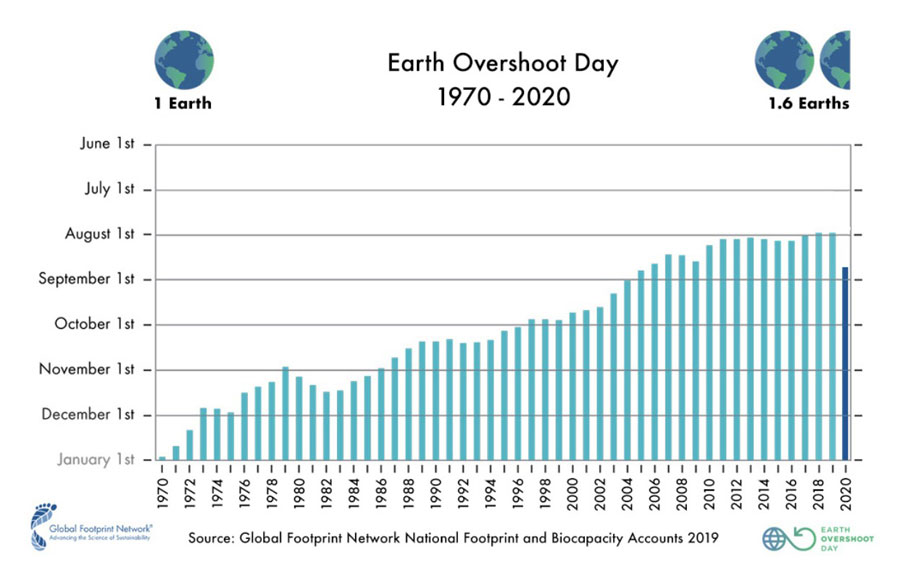
The global coronavirus lockdown has delayed Earth Overshoot Day mainly because of a decrease in wood harvesting and CO2 emissions from fossil fuel combustion, according to the Global Footprint Network.
This year, the day lands on Aug. 22, more than three weeks later than in 2019.
The date reflects the 9.3 percent reduction of humanity’s Ecological Footprint from the start of the year to Earth Overshoot Day compared to the same period last year, a direct consequence of the lockdowns, the environmental research organization said in a statement.
“Humanity has been united by the common experience of the pandemic and shown how intertwined our lives are,” said Chief Executive Laurel Hanscom.
“At the same time, we cannot ignore the deep unevenness of our experiences nor the social, economic, and political tensions which have been exacerbated by this global disaster. Making regeneration central to our rebuilding and recovery efforts has the potential to address the imbalances both in human society and in our relationship with the Earth.”
Since 2006, the environmental organization has marked the date when humanity has used all the biological resources that Earth can renew during the entire year.
After Earth Overshoot Day, for the rest of the year, the planet’s ecological deficit is maintained by drawing down local resource stocks and accumulating carbon dioxide in the atmosphere.
The year-over-year ecological footprint contraction falls short of the change which is required to achieve both ecological balance and people’s well-being, two inextricable components of sustainability, said the group, which pulls together more than 15,000 data points per country, mainly from U.N. sources.

The organization adds up competing demands for food, timber, fibers, carbon sequestration, and accommodation of infrastructure. Carbon emissions from burning fossil fuel make up 60 percent of humanity’s ecological footprint, contributing to an ecological deficit that has been increasing steadily since the early 1970s.
“The fact that Earth Overshoot Day is later this year is a reflection of a lot of suffering, and the reflection of imposed changes to our lives,” Hanscom said, according to the New York Times Climate Fwd newsletter. “I don’t think there’s a silver lining to that.”
The forest products footprint — an 8.4 percent decrease — is strongly affected by demand forecasts which, in turn, determines wood harvest, the statement said. “Although construction has been ongoing during the pandemic, the forestry industry predicted lower demand going forward and quickly reduced harvest rates,” it added.
“We ‘gained’ three weeks, but to be fully sustainable we should add another 17 weeks,” said Robert Nasi, director general of the Center for International Forestry Research (CIFOR). “This goal is clearly not reachable under our current development models.”
The global number conceals a strong injustice regarding patterns of consumption, he added, pointing out that if everyone lived like the average Indonesian, Earth Overshoot Day would not be until Dec. 18, but if everyone lived like the average Luxembourger, it would have been on Feb. 16.
“We might all be represented in it, but we are not equal,” he said. “Forests and trees can be conserved, managed and restored so that they are neutral or positive in the Earth Overshoot Day equation – there’s no reason at all why this can’t be achieved besides short-termism, greed, and ignorance of science and local knowledge.”
We want you to share Forests News content, which is licensed under Creative Commons Attribution-NonCommercial-ShareAlike 4.0 International (CC BY-NC-SA 4.0). This means you are free to redistribute our material for non-commercial purposes. All we ask is that you give Forests News appropriate credit and link to the original Forests News content, indicate if changes were made, and distribute your contributions under the same Creative Commons license. You must notify Forests News if you repost, reprint or reuse our materials by contacting forestsnews@cifor-icraf.org.
Further reading
Rollback of environmental protections grows during COVID-19 pandemic, expert says Intact forests can retain high levels of carbon in high temperatures, study shows Corporate carbon footprint pledges must be backed by transparent timelines
Spatial Assessment of Ecosystem Services from Planted Forests in Central Vietnam